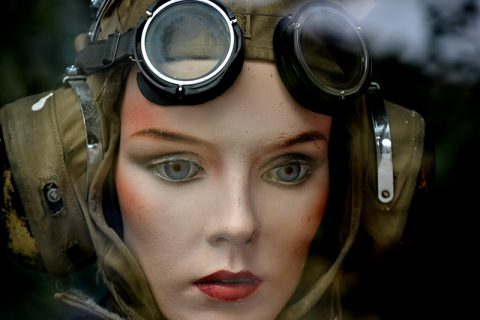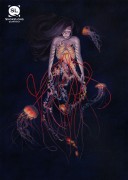“Determining the Gull Bone Index” immediately stood out to me because of the sheer absurdity of the premise combined with the characters’ ongoing appeals to normalcy—Becky’s day planner, the pillows, etc. What about this balance of the impossible and the mundane appeals to you?
I think in real life there’s a lot of absurdness going on, but most of us are simultaneously seeking normalcy. We’re funny creatures with odd habits. But in terms of story, I’m just more interested in moving immediately past that initial disbelief, exploring how people might actually interact with the impossible. Sure, all three characters could’ve been screaming and freaking out the whole time, but that’s rather one-dimensional. When you move past those visceral reactions, a range of possibilities opens up.
Something I love in this story is the way you parcel information so adroitly—the “shattered piece of airplane fuselage falling in the distance,” for example, appearing near the end. Is it important to you, as a writer or as a reader, that a story not show its hand too early? How important is mystery, especially in flash fiction?
It’s very important. Certainly, a writer needs to divulge enough information to set the mood, hook the reader, and propel the story forward. But overall, I like to keep a healthy dose of mystery throughout. In flash fiction specifically, you’ve only got a few hundred words—maybe a thousand depending on the piece—so you need to pick and choose what is said and what is unsaid. I think it’s a more satisfying experience when readers get to take imaginative leaps or intuit something for themselves. Etgar Keret is a master at this kind of writing. His stories are sharp and precise, offering enough information to move the plot, but holding back plenty.
What, if anything, is waiting for these fallers at the bottom?
That’s a surprisingly tough question. It’s one of those mystery things, especially since this is a surreal story where anything is possible. I suppose the most obvious answer is “splat!” But then why don’t these characters give up? Maybe because people are resilient. Or maybe because these characters still have each other, and that’s enough. They’ve become comrades in crisis, and splattering on the ground seems less frightening than losing sight in that thick cloud. It’s sort of like an exercise in human interaction, altruism, and comfort. In that interpretation, the focus is more on the process of falling than the moment of impact. So that tangential answer gives one option and then deflects. The blunt response is: “It’s open to interpretation.”
You’re the managing editor of The Conium Review, a great journal in its own right. How does working in this capacity at another “lit mag” inform your writing?
Lit mag editors are busy people, often unpaid, and they are reading constantly. But they’re reading constantly for a reason. They are invested in finding a perfect story. A story they love. They earnestly want that positive reaction. As a writer, I want to acknowledge that this editor is already queued up and eager to love my story, so I dispense with the preamble and try to engage the reader immediately. I often find myself cutting entire pages from the beginning of a story, diving right into the most compelling scene. In a broad sense, I suppose being an editor has taught me to trim the fat—and sometimes the meat and bones too.
And because we’re all writers here, I gotta know: What are you reading that’s giving you that “This makes me want to write better” feeling? What, in other words, is inspiring you?
I mentioned Etgar Keret earlier. I’ve spent countless hours gushing over his works, and his books will always be a major influence on my writing. Recently, I’ve been rereading Amelia Gray’s Gutshot. It takes so many risks, and it has urged me to think more reflexively about my work. Gutshot bends some rules, breaks a few others, but it also snaps the rules back to attention when needed. Amelia is always writing in a way that best serves the individual story. If you look at her bibliography—not just Gutshot, but her other three books too—her fiction shows a certain versatility that I admire.



 The core workshop of SmokeLong Fitness is all in writing, so you can take part from anywhere at anytime. We are excited about creating a supportive, consistent and structured environment for flash writers to work on their craft in a community. We are thrilled and proud to say that our workshop participants have won, placed, or been listed in every major flash competition. Community works.
The core workshop of SmokeLong Fitness is all in writing, so you can take part from anywhere at anytime. We are excited about creating a supportive, consistent and structured environment for flash writers to work on their craft in a community. We are thrilled and proud to say that our workshop participants have won, placed, or been listed in every major flash competition. Community works.